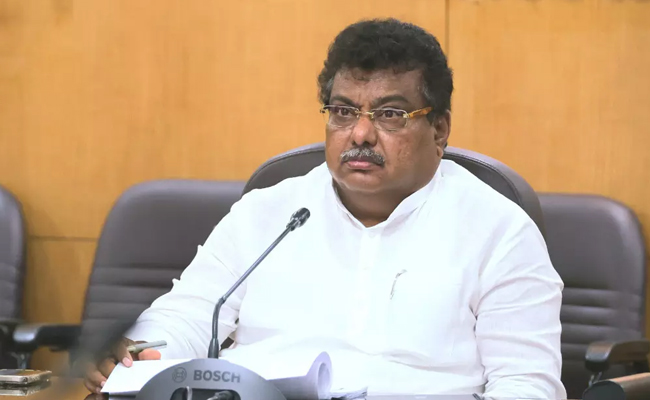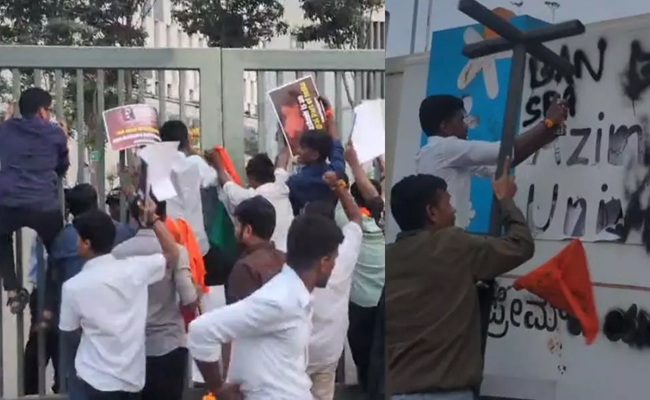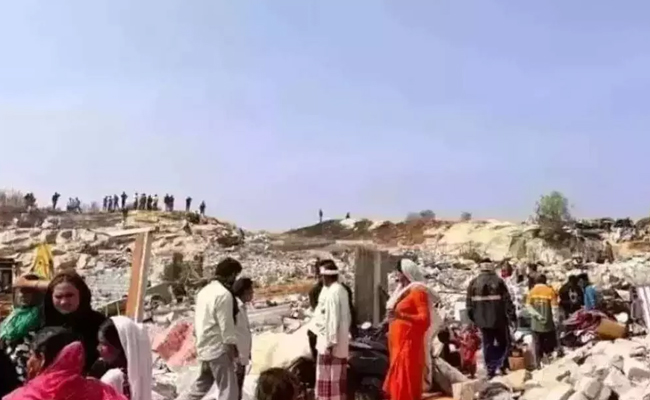Hyderabad, Mar 27: Records tumbled as Sunrisers Hyderabad went on a rampage to post the highest ever IPL total of 277 for 3 against Mumbai Indians before sealing a 31-run victory in a power-hitting contest that left bowlers on
both sides befuddled.
SRH opener Travis Head (62 off 24) and number three Abhishek Sharma (63 off 23) came up with a sensational display of power-hitting that saw the latter snatching the franchise record for the fastest fifty from the Australian within minutes.
Heinrich Klaasen (80 not out off 34 balls) provided the fireworks in the end to help SRH break an 11-year-old record. The previous highest total in IPL was 263 for five achieved by Royal Challengers Bangalore back in 2013. It was also the highest total recorded in a T20 league.
Mumbai bowlers were left shell-shocked by SRH's six-hitting spree but their batters came out with a purpose and made a match out of what looked like a one way traffic at the innings break.
Eventually, they ended at 246 for five in 20 overs.
A record 38 sixes were plundered in the game and it was the first time 500 runs were scored in a T20 match.
"The wicket was good but 277, no matter how good or bad you bowl, if the opposition get 277 that means they batted very well. It was tough out there for bowlers. Close to 500 runs were scored so the wicket was helping the batters," MI skipper Hardik Pandya said after the match.
Chasing a mammoth 278, Rohit Sharma (26 off 12), in his 200th game for the franchise, played some sublime strokes and was well complemented by Ishan Kishan (34 off 13) who got some much needed runs.
Tilak Varma (64 off 34 balls) took the game deep with a high-quality knock, comprising half a dozen sixes. At 182 for three in 14 overs and seven wickets in hand, Mumbai Indians were on course for something special before succumbing to constant scoreboard pressure.
Tim David (42 not out off 22) tried his best towards the end but it was not enough.
Earlier, it was raining fours and sixes as Head and Sharma toyed with the Mumbai Indians attack after being put in to bat.
Head, who was surprisingly left out of the playing eleven for the opening game, reinforced his status as one of the most dangerous batters in the game with a whirlwind effort.
He broke David Warner's record of the fastest fifty by a SRH batter with a 18-ball half-century before Sharma surpassed Head's feat 20 balls later by reaching the milestone in 16 balls.
Head, who was dropped by compatriot Tim David at the start of his innings, opened his front leg and hit boundaries at will, collecting nine fours and three sixes in total.
The southpaw completed his fifty with an inside out four wide of mid-off before dispatching a bouncer from Gerald Coetzee for a six over deep midwicket, prompting opposition skipper Hardik Pandya to acknowledge the Australian's brutal assault.
When Head departed, Sharma went hammer and tongs, mostly targeting the cow corner region for his seven sixes and three boundaries.
It was a nightmarish start to the IPL for the 17-year-old South Africa pacer Kwena Maphaka, who made the Mumbai Indians squad at the back of his exploits in the U-19 World Cup.
He leaked as many as 66 runs in his four overs. The left-arm pacer could not recover from Head's onslaught in his second over in which he conceded 22 runs.
With the majority of the Mumbai bowlers taken to the cleaners, it was surprising that Mumbai Indians skipper Pandya waited till the 13th over to give Jasprit Bumrah his second over.
Following Sharma's dismissal, the in-form Klaasen ensured there was no stopping to the SRH's six hitting spree. Klaasen ended up with seven sixes with the maximum off a Bumrah bouncer standing out.
Klaasen had almost taken SRH over the line with his breathtaking knock against KKR at the Eden Gardens.
Former skipper Aiden Markram chipped in 42 off 28 balls.
Let the Truth be known. If you read VB and like VB, please be a VB Supporter and Help us deliver the Truth to one and all.
Bengaluru (PTI): Karnataka Minister M B Patil on Tuesday chaired meetings with industry representatives from the aerospace and defence, machine tools, auto/EV, and green energy sectors to discuss sector growth and government support measures.
The meetings were attended by leading industrialists and their representatives, with some participating virtually.
Speaking on the occasion, the minister for Large and Medium Industries said Karnataka is at the forefront of the country’s aerospace and defence sectors.
He noted that Suzuki and Toyota plan to launch aerial taxi services in Japan by 2028, with Bengaluru-based Sasmos supplying electrical equipment for the project.
Industrialists suggested introducing similar “fly-taxi” services in Karnataka through an appropriate policy, which Patil said would be examined seriously.
The minister highlighted the need to establish testing centres and Common Facility Centres for the aerospace and defence industries and assured that these facilities would be provided.
Suggestions were also made to prepare a comprehensive roadmap for sector growth.
Karnataka has urged the Central Government to approve Defence Corridor projects in the Bengaluru North–Kolar–Chikkaballapur and Dharawada–Vijayapura–Belagavi regions.
Industrialists also suggested a corridor between Bengaluru and Mysuru, Patil said.
He said Karnataka aims to become a hub for defence electronics manufacturing, with plans to establish a 200-acre Defence Electronics Park and a 100-acre Avionics and Sensor Park.
These projects will be implemented once the Special Investment Region is operational, and land availability will not be an issue.
On the machine tools sector, Patil said the industry has recorded an annual turnover of Rs 36,500 crore and is witnessing steady growth.
Large-scale exhibitions have increased demand, and the state must strengthen its capabilities to develop control systems for heavy machinery. One testing unit is already operational in Bengaluru, with another planned for Tumakuru. Expansion of vocational training institutes in industrial areas is also underway.
In the Auto and EV sector, Vision Group members highlighted the need for a network of dry ports and more EV charging stations across the state.
Patil noted that the Tata Group is manufacturing EV buses in Dharawada for nationwide supply. Plans for mini excavator production and export facilitation were also discussed, along with the establishment of a testing facility for two-wheeler EVs.
For the Green Energy sector, the group emphasised the need for a suitable policy on battery-based energy storage and the establishment of data centres.
Patil assured that the government will seriously consider all suggestions and respond positively.





_vb_21.jpeg)